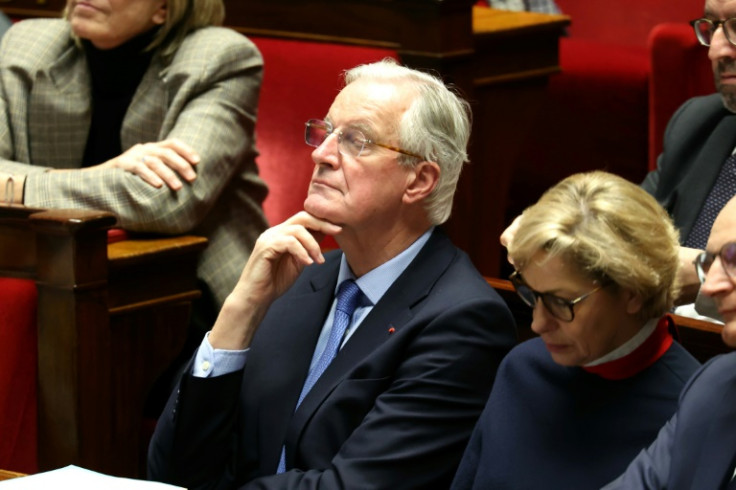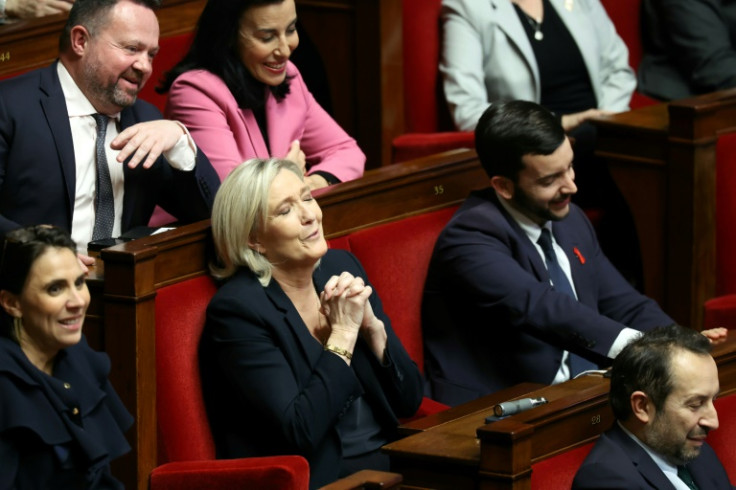French PM Meets Macron To Resign After No-confidence Vote

French Prime Minister Michel Barnier on Thursday was meeting Emmanuel Macron to submit his resignation after losing a vote of no confidence in parliament, with the president urgently seeking ways to halt growing political and financial chaos.
Poised to be contemporary France's shortest-serving premier, Barnier arrived at the Elysee Palace just after 0900 GMT for the resignation formality, with the outgoing premier and government constitutionally obliged to step down after the defeat in parliament.
A majority of lawmakers on Wednesday supported the no-confidence vote proposed by the hard left and backed by the far right headed by Marine Le Pen.
Barnier's record-quick ejection comes after snap parliamentary elections this summer, which resulted in a hung parliament with no political force able to form an overall majority and the far right holding the key to the government's survival.
The trigger for Barnier's ouster was his 2025 budget plan including austerity measures that were unacceptable to a majority in parliament, but that he argued were necessary to stabilise France's finances.
On Monday he had forced through a social security financing bill without a vote.
The successful no-confidence motion cancelled the government's entire financing plan, leading to an automatic renewal of the current budget into next year, unless any new government can somehow rush through approval of a new budget by Christmas -- an unlikely scenario.
"France probably won't have a 2025 budget," said ING Economics in a note, predicting that the country "is entering a new era of political instability".
Moody's, a ratings agency, warned that Barnier's fall "deepens the country's political stalemate" and "reduces the probability of a consolidation of public finances".
The Paris stock exchange fell at the opening on Thursday before recovering to show small gains, while the yields on French government bonds were again under upward pressure in debt markets.
Macron now has the unenviable task of picking a viable successor.
The president will address the nation at 8:00 pm (1900 GMT), his office said.
Macron has more than two years of his presidential term left, but some opponents are calling on him to resign.
National Assembly Speaker Yael Braun-Pivet on Thursday urged Macron to waste no time in choosing a new premier, saying that France could not be allowed to "drift" for any length of time.
There was no indication early on Thursday of how quickly Macron would appoint Barnier's successor, nor what their political leanings might be.
Loyalist Defence Minister Sebastien Lecornu and Macron's centrist ally Francois Bayrou have been touted as possible contenders, as has former Socialist premier and interior minister Bernard Cazeneuve.
With the support of the far right, a majority of 331 MPs in the 577-member chamber voted to oust the government on Wednesday night.
It was the first successful no-confidence vote since a defeat for Georges Pompidou's government in 1962, when Charles de Gaulle was president.
Macron flew back into Paris just ahead of the vote after wrapping up a three-day state visit to Saudi Arabia, an apparent world away from the domestic crisis.
"We are now calling on Macron to go," Mathilde Panot, head of the parliamentary faction of the hard-left France Unbowed (LFI) party, told reporters.
She urged "early presidential elections" to solve the deepening political crisis.
But taking care not to crow over the government's fall, Le Pen said in a television interview that her party -- once a new premier is appointed -- "would let them work" and help create a "budget that is acceptable for everyone".
Laurent Wauquiez, the head of right-wing deputies in parliament, said the far right and hard left bore the responsibility for a no-confidence vote.
Barnier is the fifth prime minister to serve under Macron since he came to power in 2017, with every premier serving a successively shorter period.
Given the composition of the National Assembly, there is no guarantee that Barnier's successor would last any longer.
Strike calls across transport, education and other public sector services were kept in place on Thursday despite the disappearance of the austerity budget that has prompted anger.
The plunge into more uncertainty comes ahead of the reopening of the Notre-Dame cathedral on Saturday after a 2019 fire, a major international event hosted by Macron.
Guests include Donald Trump on his first foreign trip since he was elected US president.


© Copyright AFP 2025. All rights reserved.





















